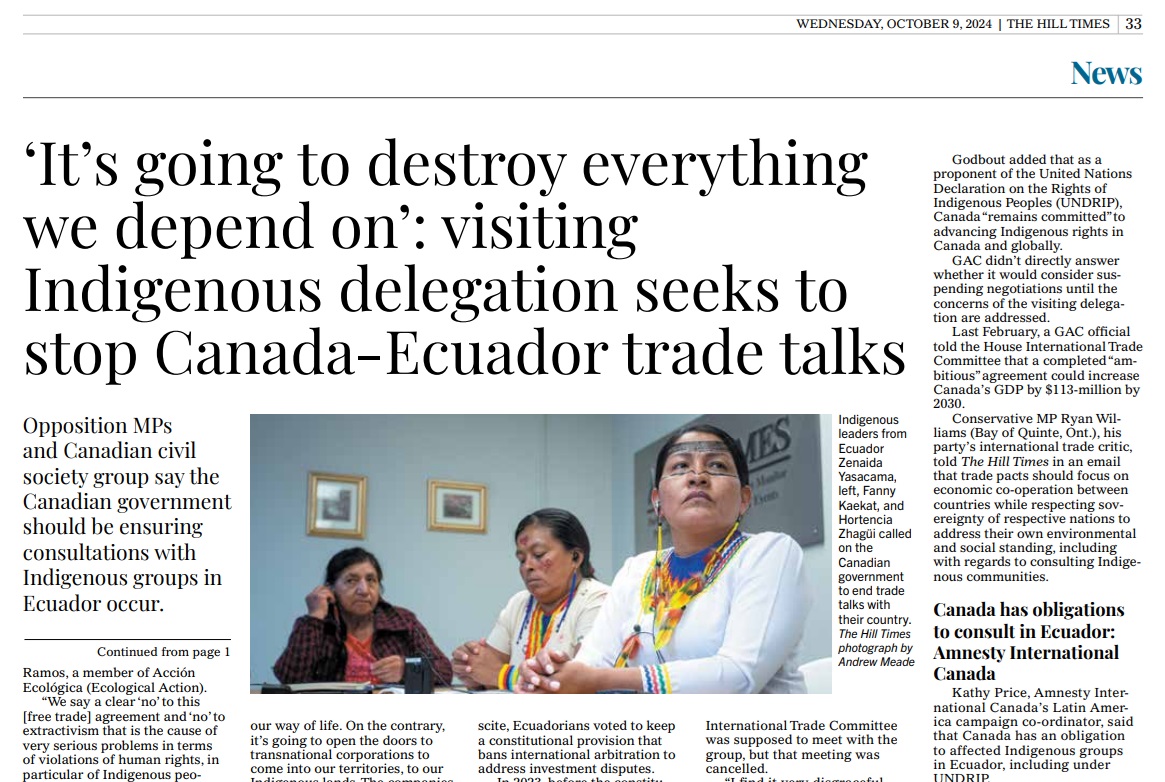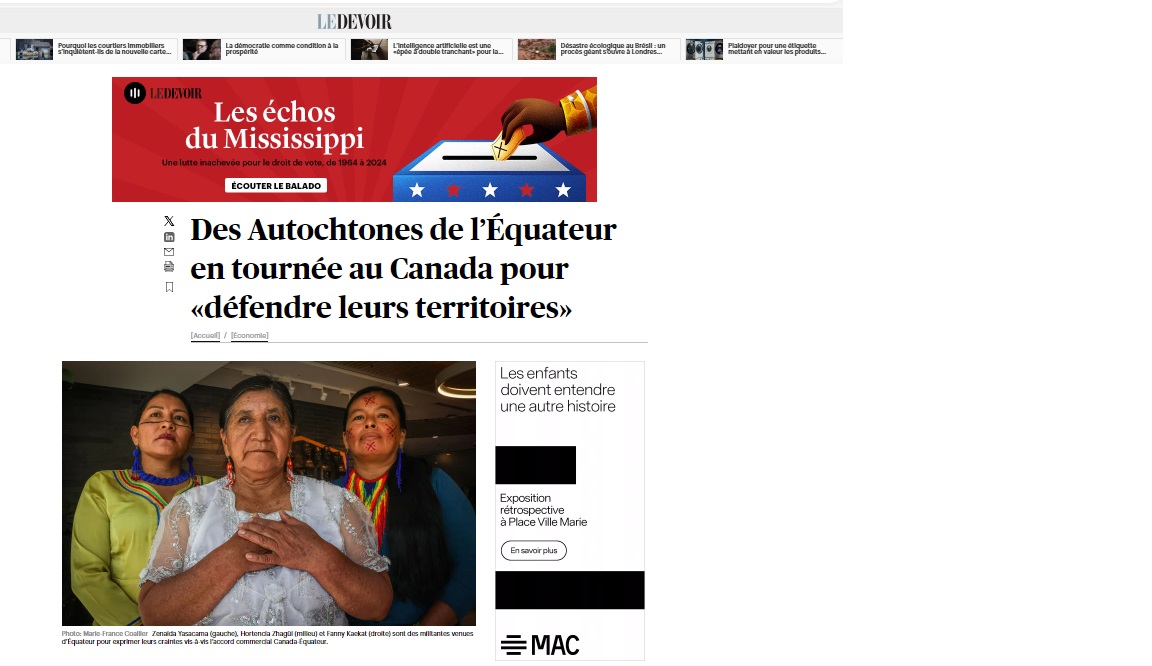From 29 September to 6 October 2024, Amnesty International Canada co-hosted a delegation of Indigenous women leaders and environment defenders from Ecuador. The visit was organized with the Canadian Centre for Policy Alternatives, the Canadian Labour Congress (CLC), KAIROS Canada and MiningWatch Canada, with the support of 13 trade unions and civil society organizations. In the context of Canada-Ecuador free trade negotiations that have quickly advanced amid profound concerns, the goal of the visit was to enable the voices of the Ecuadorian women defenders to be heard and their calls to be delivered to Canadian decision-makers.
Members of the delegation from Ecuador
- Zenaida Yasacama, of the Kichwa Ancestral People of Pakayaku, is vice-president of the Confederation of Indigenous Nationalities of Ecuador (CONAIE), the largest Indigenous rights organization in Ecuador.
- Fanny Kaekat is a leader of the Shuar Arutam People and Amazonian Women Defenders of the Rainforest, a collective formed by women belonging to the seven Indigenous Nations of the Ecuadorian Amazon.
- Hortencia Zhagüi is a representative of the Board of Potable Water Administrators of Victoria del Portete and Tarqui and a member of the Kimsakocha Women’s School of Agroecology, which promotes food sovereignty.
- Ivonne Ramos works with Acción Ecológica (Ecological Action). She is a member of the Latin American Network of Women Defenders of Social and Environmental Rights and the Saramanta Warmikuna network of women defenders of nature.
During their time in Canada, the delegation met with parliamentarians and government authorities, including the Parliamentary Secretaries to the Minister of Foreign Affairs and Minister of Export Promotion, International Trade and Economic Development, as well as Canada’s Ambassador for Women, Peace and Security. The delegation also met with Indigenous organizations, trade unions and other civil society representatives creating alliances for future action. Public events took place in Toronto, Ottawa and Montreal.
Here is what the delegation shared in their meetings
- We are deeply concerned about the worsening human rights crisis in Ecuador, characterized by, among other things, the adoption of hard-line and militarized security policies and executive decrees, abuses by state security forces, lack of respect for constitutional guarantees, widespread violations of the rights of Indigenous Peoples, and impunity, as well as increasing persecution, including intimidation, stigmatization, harassment, false accusations, criminalization, imprisonment and attacks against those who defend their rights, particularly when they express opposition to the impacts of resource extraction projects.
- Canada and Ecuador are accelerating the negotiation of a free trade agreement that the Canadian government describes as progressive, inclusive and based on respect for human rights. However, in Ecuador, Indigenous Peoples and peasant communities that will be affected have not been informed or consulted. To date, no independent human rights impact assessment has been conducted. A confidentiality agreement signed in August 2024 undermines access to information, transparency and trust. Meanwhile, mobilization against resource extraction that violates human rights and damages the environment is growing.
- Indigenous Peoples and peasant communities affected by existing Canadian mining projects in Ecuador are deeply concerned that the environmental damage, human rights violations and social harms they are already experiencing – including increased violence against women and girls, and life-threatening social conflicts – will multiply if a new trade agreement increases mining in Ecuador. Ecologically sensitive areas are at serious risk from resource extraction, including high-altitude wetlands and the Amazon region, which is at a tipping point. For this reason, we express our profound rejection of the Canada-Ecuador FTA negotiations.
- Canada and Ecuador are trying to include strong investor protections and investor-state dispute settlement (ISDS) in the trade agreement at the request of the mining industry – despite Ecuador’s constitutional ban on ISDS. The vote against international investment arbitration in Ecuador’s 2024 national referendum and the ongoing objections of Canadian unions and civil society organizations are a clear rejection of ISDS. ISDS in any form would prioritize the rights of transnational corporations over communities and the environment. Multiple human rights bodies have challenged ISDS as a threat to the realization of human rights, the rights of Indigenous Peoples and our ability to address the climate emergency. Canada withdrew ISDS from the renegotiated North American Free Trade Agreement (NAFTA) supposedly to protect the right to regulate and protect the environment and public health in Canada.
- Canada has yet to implement binding mechanisms to hold corporations accountable for human rights violations and environmental harm, or to ensure access to remedy. The Canadian Responsible Business Ombudsman has serious shortcomings.
- We urgently call for the immediate withdrawal of Canadian resource extraction projects that have violated human rights, collective rights, and the rights of nature, and which operate without the consent of affected peoples, including Dundee Precious Metals’ Loma Larga mega-mining project (Azuay, Cuenca canton, Victoria del Portete parish); Lundin Gold’s Fruta del Norte project (Zamora Chinchipe, Yantzaza canton, Los Encuentros parish); Fierro Urco mining project (Loja and El Oro); Fortuna Mining’s Fortuna Project (Azuay, Morona Santiago and Zamora Chinchipe); Solaris Resources’ Warintza Project (Morona Santiago, Cordillera del Cóndor, southern Amazon); and Atico Mining’s La Plata project (Cotopaxi, Sigchos canton, Palo Quemado). Our territories are not for sale.
- Canada must fulfill its obligations to respect human rights standards, including the UN Declaration on the Rights of Indigenous Peoples, International Labour Organization conventions, and all international standards that protect the rights of rural communities, women and girls, and the right to a healthy environment.
- In a context of the climate crisis and environmental collapse, we firmly reject Canadian mining in the Amazon, the Andean Sierra, páramo wetlands and other key water sources, and other ecologically sensitive areas.
- Canada must enact binding mechanisms through legislation to hold Canadian companies accountable for human rights abuses and environmental damage and to provide access to remedy.
- We reiterate our profound rejection of the Ecuador-Canada FTA that is being negotiated without transparency or consent, amidst a deepening of a crisis of denial of human rights, collective rights, and the rights of nature.

Media coverage
The delegation from Ecuador held a recorded press conference on Parliament Hill on October 2. They were heartened by public interest in their message, which included the following stories in mainstream media:

- “It’s going to destroy everything we depend on”, The Hill Times
- Indigenous women from Ecuador urge Ottawa to halt free trade agreement, raise objections over mining, Globe and Mail
- Indigenous women from Ecuador bring concerns on mining abuses, free trade to Parliament Hill, CBC News
- Interview with Amnesty International Secretary General Ketty Nivyabandi, CBC As it Happens
- Des Autochtones de l’Équateur en tournée au Canada pour «défendre leurs territoires», Le Devoir
- Defensa territorial: mujeres indígenas de Ecuador y Canadá, unidas, Radio Canada International


Sign this e-action calling on Canada’s Trade Minister to ensure there is no Ecuador trade deal without human rights guarantees or consent.
Additional Information
- Ecuadorian Indigenous women and rights defenders bring concerns to Canada amid high-stakes trade negotiations
- Canada’s Mining Footprint in Ecuador: A brief on the impacts of mining as trade negotiations advance
- What’s at stake in Canada’s trade negotiations with Ecuador: Investor protections vs the rights of communities and nature
- Amnesty International Canada shares concerns at parliamentary study of free trade negotiations with Ecuador
- Amnesty International Canada’s submission to public consultations on a potential free trade agreement between Canada and Ecuador
For more information, contact Latin America campaigner Kathy Price via kprice@amnesty.ca






















